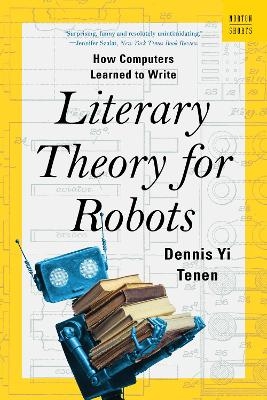
Literary Theory for Robots
How Computers Learned to Write
Seiten
2025
WW Norton & Co (Verlag)
978-1-324-10505-3 (ISBN)
WW Norton & Co (Verlag)
978-1-324-10505-3 (ISBN)
- Noch nicht erschienen (ca. März 2025)
- Portofrei ab CHF 40
- Auch auf Rechnung
- Artikel merken
In the industrial age, automation came for the shoemaker and the seamstress. Today, it has come for the writer, physician, programmer and attorney
Literary Theory for Robots reveals the hidden history of modern machine intelligence, taking readers on a spellbinding journey from medieval Arabic philosophy to visions of a universal language, past Hollywood fiction factories and missile defence systems trained on Russian folktales. In this provocative reflection on the shared pasts of literature and computer science, former Microsoft engineer and professor of comparative literature Dennis Yi Tenen provides crucial context for recent developments in AI, which holds important lessons for the future of humans living with smart technology.
Intelligence expressed through technology should not be mistaken for a magical genie, capable of self-directed thought or action. Rather, in highly original and effervescent prose with a generous dose of wit, Yi Tenen asks us to read past the artifice—to better perceive the mechanics of collaborative work. Something as simple as a spell-checker or a grammar-correction tool, embedded in every word-processor, represents the culmination of a shared human effort, spanning centuries.
Smart tools, like dictionaries and grammar books, have always accompanied the act of writing, thinking and communicating. That these paper machines are now automated does not bring them to life. Nor can we cede agency over the creative process. With its masterful blend of history, technology and philosophy, Yi Tenen’s work ultimately urges us to view AI as a matter of labour history, celebrating the long-standing cooperation between authors and engineers.
Literary Theory for Robots reveals the hidden history of modern machine intelligence, taking readers on a spellbinding journey from medieval Arabic philosophy to visions of a universal language, past Hollywood fiction factories and missile defence systems trained on Russian folktales. In this provocative reflection on the shared pasts of literature and computer science, former Microsoft engineer and professor of comparative literature Dennis Yi Tenen provides crucial context for recent developments in AI, which holds important lessons for the future of humans living with smart technology.
Intelligence expressed through technology should not be mistaken for a magical genie, capable of self-directed thought or action. Rather, in highly original and effervescent prose with a generous dose of wit, Yi Tenen asks us to read past the artifice—to better perceive the mechanics of collaborative work. Something as simple as a spell-checker or a grammar-correction tool, embedded in every word-processor, represents the culmination of a shared human effort, spanning centuries.
Smart tools, like dictionaries and grammar books, have always accompanied the act of writing, thinking and communicating. That these paper machines are now automated does not bring them to life. Nor can we cede agency over the creative process. With its masterful blend of history, technology and philosophy, Yi Tenen’s work ultimately urges us to view AI as a matter of labour history, celebrating the long-standing cooperation between authors and engineers.
Dennis Yi Tenen is an associate professor of English and comparative literature at Columbia University. Originally a software engineer at Microsoft, Yi Tenen is now an affiliate of Columbia’s Data Science Institute. He lives in New York City.
| Erscheint lt. Verlag | 18.3.2025 |
|---|---|
| Zusatzinfo | 7 illustrations |
| Verlagsort | New York |
| Sprache | englisch |
| Maße | 140 x 211 mm |
| Gewicht | 148 g |
| Themenwelt | Geisteswissenschaften ► Sprach- / Literaturwissenschaft ► Sprachwissenschaft |
| Informatik ► Theorie / Studium ► Künstliche Intelligenz / Robotik | |
| Naturwissenschaften | |
| Sozialwissenschaften ► Soziologie | |
| ISBN-10 | 1-324-10505-4 / 1324105054 |
| ISBN-13 | 978-1-324-10505-3 / 9781324105053 |
| Zustand | Neuware |
| Informationen gemäß Produktsicherheitsverordnung (GPSR) | |
| Haben Sie eine Frage zum Produkt? |
Mehr entdecken
aus dem Bereich
aus dem Bereich
Buch | Softcover (2024)
REDLINE (Verlag)
CHF 27,95
Eine kurze Geschichte der Informationsnetzwerke von der Steinzeit bis …
Buch | Hardcover (2024)
Penguin (Verlag)
CHF 39,20


